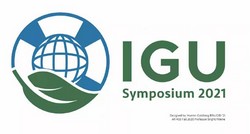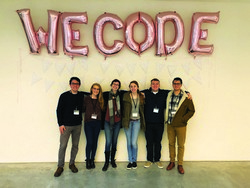The Institute for Global Understanding (IGU) held its first biennial symposium on human rights and the environment from Mar. 25-27.
Featuring experts from the government, nonprofit, academic, community, and private sectors, the symposium examined topics that intersected human rights and the environment. Panelists addressed regulatory responses, litigation, academic and scientific discourse.
Thursday began with opening remarks from President Patrick F. Leahy and Interim Provost Rekha Datta, followed by a lecture on climate migration, racial crises, and the history and future of climate justice by Maxine Burkett, a Professor of Law at the William S. Richardson School of Law.
“If there’s ever been a time when we need increased global understanding, it is right now.” Leahy said. “All you need to do is look at the events in our country over the last week or so to realize that we desperately need great global understanding, not only in our country but around the world. I’m so proud that Monmouth University is doing its part… in creating greater mutual understanding here on our campus and in our community across the state, and I hope in some small way around the world.”
Friday featured a series of panels moderated by Professor James R. May of the Delaware Law School and Professor Randal Abate, as well as a Monmouth faculty panel moderated by Catherine N. Duckett, Ph.D. and Tony MacDonald, Esq.
Joshua C. Gellers, Ph.D., of the University of North Florida, gave a lecture on the rights-based approaches to environmental protection: implementation, translations, and future research.
Marijuana Mladenov, Ph.D. Faculty of Law for Commerce and Judiciary at the University Business Academy in Novi Sad, Serbia, followed with a lecture on access to safe drinking water and sanitation under the European convention on human rights.
Maria Antonia Tigre, LL.M., of the Elisabeth Haub School of Law at Pace University provided a view of COVID-19 in Latin America, greening the jurisprudence of the inter-American human rights system through indigenous claims.
Lina Muñoz-Avila, Ph.D. of the Universidad del Rosario in Colombia, gave a lecture on protecting Latin America’s environment and the role of women environmental defenders.
Deepa Badrinarayana, S.J.D., of Chapman University and the Fowler School of Law, emphasized getting environmental justice “right.” Badrinarayana’s lecture proposed a first step to reinforce the normative importance of a constitutional right to environmental protection by focusing on the Due Process Clause of the Fourteenth Amendment.
Professor Rebecca Bratspies of the CUNY School of Law dissected “Mayah’s Lot,” the first book in the Environmental Justice Chronicles series. Bratspies’ lecture chronicled how the story has been used to teach basic civics, to build environmental justice awareness, and to cultivate a new generation of environmental leaders.
Begaiym Esenkulova, S.J.D., of American University of Central Asia (Kyrgyz Republic) promoted environmental and human rights protections in an international investment treaty regime.
Stellina Jolly, Ph.D., of South Asian University in India gave a lecture on India’s paradigm shift in its deepening environmental crisis, despite the enactment of extensive legislation, regulations, and administrative measures.
Jonathan M. Scherch, Ph.D. Pacific Bamboo Resources offered a lecture on advancing bamboo resources in service of critical needs. The bamboo plant has been an important feature of cultural and socio-economic development throughout the world for thousands of years.
Friday afternoon signaled the first Monmouth exclusive faculty panel, moderated by Duckett.
Melissa Alvare, Ph.D. lecturer in the Department of Political Science and Sociology, gave a lecture on resisting the “rising tide” of climate gentrification. The pursuit of climate justice entails working to address such environmental inequality, protecting groups that have historically borne environmental burdens.
Kathleen Grant, Ph.D., Assistant Professor of the School of Education, provided a lecture on the interconnected challenges and solutions towards the fight for climate and racial justice. The presentation detailed how the values associated with white supremacy culture, such as individualism, power hierarchies, and domination, are at the root of both environmental destruction and racism.
Eric Fesselmeyer, Ph.D., Associate Professor of the Leon Hess Business School, presented evidence on urban heat and sorting becoming categorized by income and race. There is evidence that low income and minority households suffer disproportionately from high urban temperatures and to urban temperature changes in countries with high urban income segregation.
Abha S. Sood, Ph.D., Lecture of the Department of English, presented her research on the displaced community of Isle de Jean Charles, Louisiana. The presentation retraced the history of the current Native American inhabitants and the actions which led to the island becoming uninhabitable.
Friday evening shifted to the second round of the Monmouth exclusive faculty panel, moderation duties now operated MacDonald.
John G. Comiskey, Ed.D., of the Department of Criminal Justice, gave a lecture on “Climate Insecurity: An Anthropocene Security Approach to a Sustainable Global Future.” The paradigm that once focused on the survival of the state now evolved to include nontraditional national-security issues such as public health, environmental degradation, poverty, crime, and terrorism, Comiskey’s lecture explained.
Tom Herrington, Associate Director of the Urban Coast Institute, provided a presentation titled “Climate Change-driven Coastal Migration: State of Our Knowledge and Required Research Questions that Need to Be Answered.” The lecture detailed permanent population displacement that comes as a result of natural disasters.
Friday’s lectures ended with a presentation by Robin Mama, Ph.D., Dean of the School of Social Work. She explained the 17 Sustainable Development Goals which recognize that ending poverty and other deprivations must go hand-in-hand with strategies that improve health and education, reduce inequality, and spur economic growth – all while tackling climate change and working to preserve our oceans and forests.
Saturday, the symposium’s final day, began with a global perspective on climate and energy justice roundtable moderated by Abate. The roundtable featured lectures by Patrícia Galvão Ferreira, S.J.D. of the University of Windsor Faculty of Law, Esmeralda Colombo, LL.M., University of Bergen in Norway, Jae-Hyup Lee, J.D., Ph.D. of the Seoul National University School of Law in South Korea, and Damilola Olawuyi, LL.M., of the Hamad Bin Khalifa University Law School in Qatar.
The afternoon featured a documentary film screening and commentary of Kivalina: Life in the Modern Arctic, with appearances by Gina Abatemarco, Writer and Director, and Kelsey Leonard, Ph.D., an Assistant Professor in the Faculty of Environment at the University of Waterloo.
IMAGE TAKEN from Monmouth.edu



